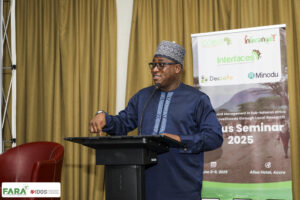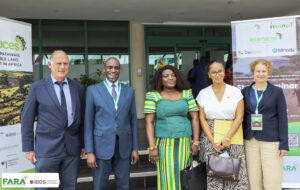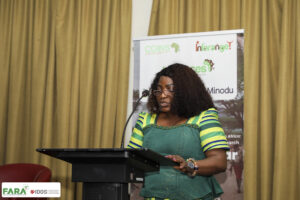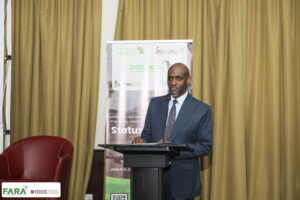By Juliet ETEFE ([email protected])
The Minister of Environment, Science, Technology and Innovation (MESTI), Dr. Ibrahim Murtala Muhammed, has disclosed that government is engaging development partners and evaluating proposals aimed at reclaiming lands devastated by illegal mining activities, popularly known as ‘galamsey’.
Speaking at the INTERFACES Status Seminar held in Accra, Dr. Muhammed emphasised that reclaiming degraded lands is not a one-off event but a long-term process that requires scientific input, stakeholder collaboration, and sustained investment.
“We are engaging partners to come up with means by which we can reclaim those lands. It needs scientific work and substantial investment. Even if you reclaim the land and do not do it well, they cannot use it for farming because the topsoil—which contains the nutrients—would have been destroyed,” he stated ,referencing farmlands used for illegal mining.

He revealed that several proposals had been received and were currently under evaluation.
Sustainable land management
Dr. Muhammed called for a shift towards sustainable land management and climate-smart agriculture, warning that land degradation has severe economic implications.
He linked the rise in Ghana’s import bill for rice and poultry—from US$500 million in 2016 to over US$3 billion by 2025—to poor agricultural productivity due in part to degraded lands.
“When we spend billions importing what we can produce, it affects the economy, job creation, and livelihoods,” he noted.
He highlighted the role of research in reversing land degradation and promoting responsible agricultural practices. To that end, he announced the launch of Ghana’s first Science and Technology Forum, to be held bi-annually, bringing together academia, research institutions, and the private sector to translate research findings into actionable solutions across sectors including agriculture.
The Minister also applauded the Forum for Agricultural Research in Africa (FARA), based in Ghana, for its leadership in agricultural innovation, capacity building, and knowledge management across the continent.
Commitment
He reiterated government’s commitment to creating an enabling policy environment for the mainstreaming of research-based solutions and building local capacity through partnerships that prioritise knowledge transfer over mere financial aid.

Status Seminar
The Status Seminar 2025, funded by the German Institute of Development and Sustainability (IDOS), FARA and the Centre for Development Research (ZEF) at the University of Bonn, convened over 120 experts from across Africa and Europe to exchange knowledge on inclusive and climate-resilient land management in Sub-Saharan Africa.
Organised under the INTERFACES project, the event highlighted FARA’s role in advancing sustainable land use through capacity building, knowledge management and policy engagement.
It featured key outcomes from projects such as COINS, DecLaRe, Minodu, and InfoRange, showcasing how locally adapted solutions—driven by collaboration among researchers, communities, and policymakers—are helping address critical challenges like soil degradation, gender inequality, and food insecurity.

Gender disparities in land governance
Delivering an address on behalf of the Vice President Professor Naana Jane Opoku-Agyemang, Dr. Miriam Iddrisu highlighted the urgency of addressing gender disparities in land governance across Sub-Saharan Africa.
She stressed that sustainable land management and climate resilience are unattainable if women remain excluded from foundational systems such as land governance.
She said while women constitute nearly half of the agricultural workforce, their access to land, credit, and decision-making remains severely constrained.
“This gender gap is not only unfair, it is inefficient and detrimental to economic and environmental sustainability,” she emphasised.
Legal and cultural barriers, she noted, continue to prevent women from owning or inheriting land, with their voices largely absent in land-related policymaking.
As such, called for deeper collaboration among traditional authorities, researchers, civil society, and policymakers to advance inclusive reforms, while reiterating the government’s commitment to ensuring that every woman has the opportunity to thrive in agriculture, with land as a platform for empowerment, productivity and resilience.

Strategic partnerships and FARA’s role
For his part, Executive Director of FARA, Dr. Aggrey Agumya, reiterated the importance of strategic partnerships in turning agricultural research into real-world impact.
“We stand at a crossroads. Our agricultural systems, particularly those led by smallholder farmers, are facing serious threats—from degraded soils and low productivity to climate-related shocks and weak institutional support. Strategic collaboration is no longer optional; it is essential,” he noted, underscoring the power of collaboration in addressing degraded soils, climate change, and food insecurity.
He highlighted FARA’s leadership role in the INTERFACES initiative—driving knowledge management, science communication, and capacity strengthening across Sub-Saharan Africa.
Dr. Agumya also celebrated the achievements of INTERFACES Knowledge Management Fellows and reaffirmed FARA’s commitment to building resilient agricultural systems through inclusive innovation, institutional support and youth engagement.
He also expressed gratitude to the Government of Ghana for its sustained support to FARA, including hosting its Secretariat within the CSIR enclave and the recent commitment to provide a dedicated office space to enhance FARA’s operations.










